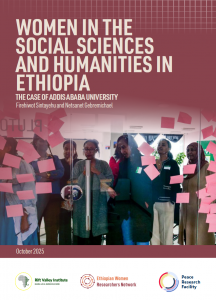This preliminary assessment is part of the launch exercise of the Ethiopian Women Researchers’ Network (EWNET). Focusing on Addis Ababa University as a pioneering higher institution in the country, the study looks into the status of women within these disciplines examining their representation, research activities, mobility challenges, and other factors that influence their academic engagement. AAU was selected as it is a pioneering university in the country. The assessment reveals that despite AAU’s leading position in research, women are underrepresented among the faculty and in their research output, as evidenced by publication rates in peer-reviewed journals.
The research attested that existing networks remain male-dominated and largely exclude women, limiting access to opportunities, mentorship, and support. Gender stereotypes also contribute towards relegating women’s role in assignments and limiting them to specific research areas, often perceived as less challenging.
Women researchers grapple with the challenges of maintaining work-family balance, overcoming mobility challenges, as well as countering stereotypes within their institutions and the community. These challenges significantly reduce their access to research opportunities and lead to multifaceted obstacles in their research endeavours.
Despite these obstacles, women researchers are coping by asserting themselves at their institutions and advocating for change. They navigate through stereotypes and operational mobility challenges through various mechanisms. Women researchers use mini-networks within their departments and institutes to support one another and advocate for the inclusion of women. The increasing number of women in the social sciences and humanities is also likely to play a positive role.
EWNET may undertake the following activities in order to enhance women’s engagement in social science and humanities research:
- Document the experience of female researchers in Ethiopia: Women will be able to share their personal and professional experiences through the network, as it can help define Ethiopian women researchers by their own unique challenges.
- Foster formal and informant connections and relationships among women: Networks of women researchers should not only focus on professional work but also foster informal connections and relationships. Discussions and experience-sharing sessions are essential to help women researchers navigate through challenges. Creating awareness, especially for junior academics, is crucial in helping them define themselves and their goals.
- Capacity building initiatives: Women researchers in social sciences and humanities would benefit from training on time management, communication skills and grant writing, skills that are essential for women to succeed in academia and advance their careers.
- Platforms to apply for grants: Women will be able to work together if they manage to win research grants through collaborations. EWNET may serve as a platform to enable female researchers to identify funding and collaboration opportunities.
Platforms for exchange and learning: Creating platforms for women to share their work, present research and learn from each other is crucial. This would help women understand who is working in what areas, share challenges and discuss coping strategies. These exchanges may also be in the form of mentorship through which senior researchers support and collaborate with junior researchers.
The Ethiopian Women Researchers Network
This report was produced by the Ethiopian Women Researchers Network within the Peace Research Facility. EWNET is dedicated to creating a vibrant and supportive network for Ethiopian women researchers in the social sciences and humanities. EWNET uses platforms such as podcasts and seminar series to disseminate and amplify the voices, work and research journeys of Ethiopian women researchers.




